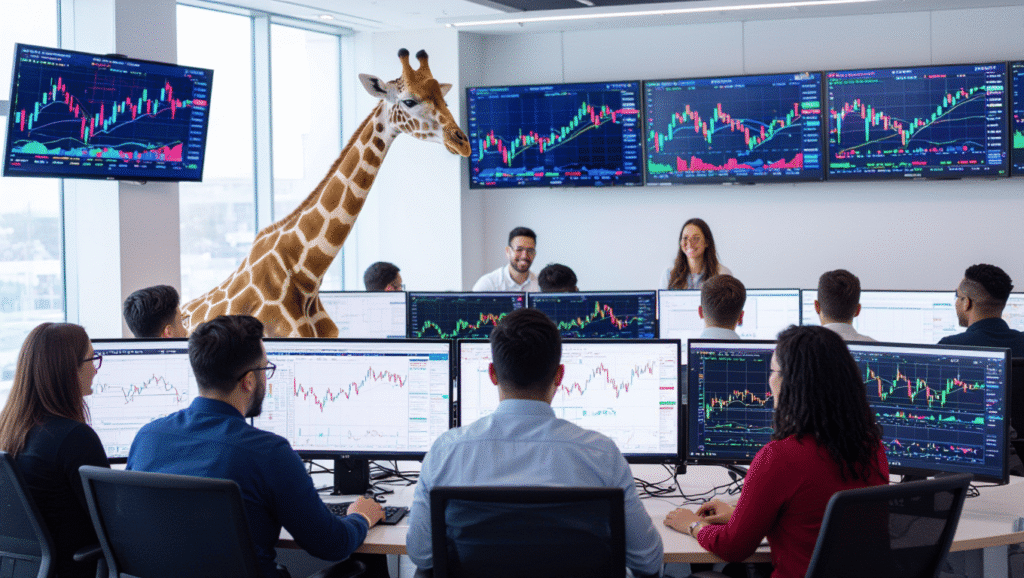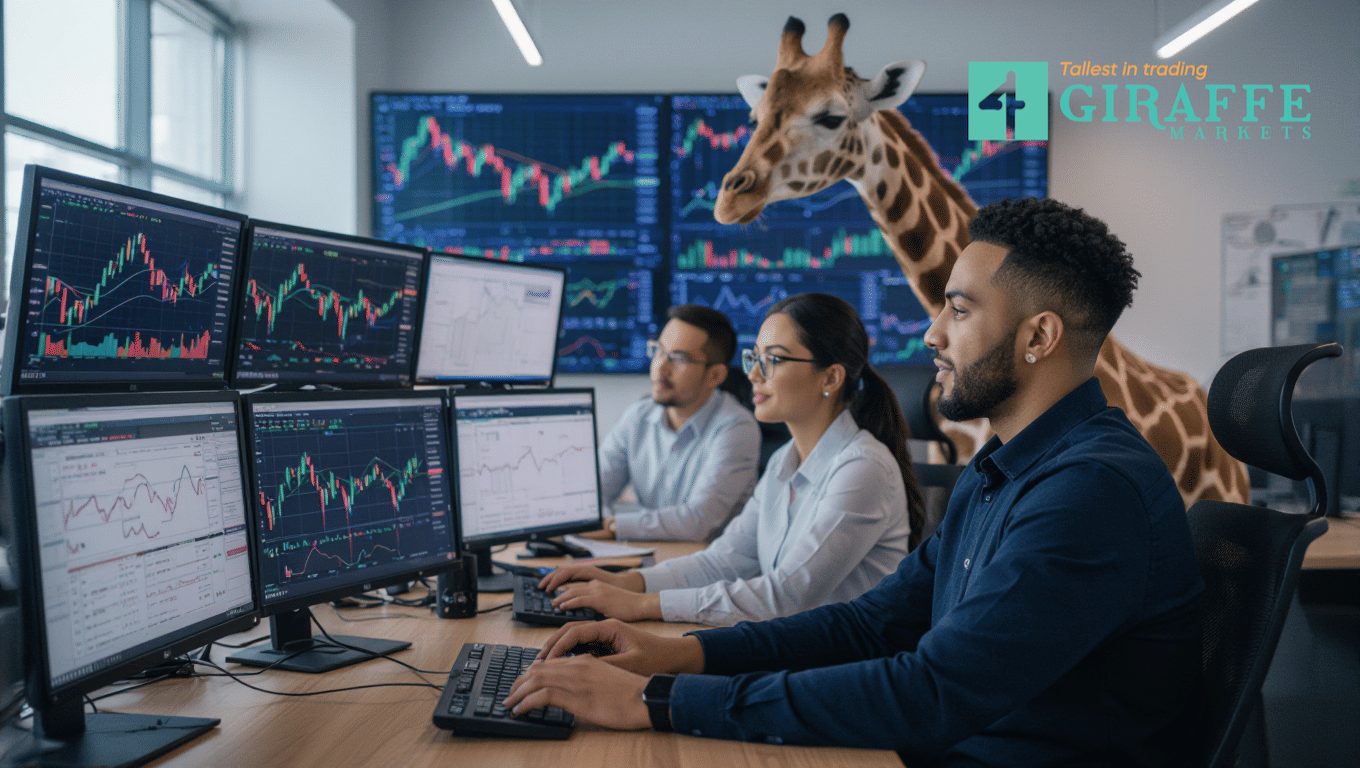
Trends Shaping the Future of Forex: What GiraffeMarkets is Watching Closely ?
The foreign exchange market, commonly referred to as Forex, is a dynamic and ever-evolving landscape that plays a pivotal role in the global economy. As the largest financial market in the world, with a daily trading volume exceeding $6 trillion, Forex is influenced by a myriad of factors ranging from economic indicators to geopolitical events. Understanding the prevailing trends within this market is essential for traders and investors alike, as these trends can significantly impact currency valuations and trading strategies.
In recent years, the Forex market has witnessed a transformation driven by technological advancements, changing investor behaviours, and the emergence of new financial instruments. As traders adapt to these shifts, it becomes increasingly important to stay informed about the latest trends that shape the market. This article delves into various aspects of Forex trading, exploring how technology, global events, cryptocurrencies, social media, ethical investing, artificial intelligence, and regulatory changes are influencing the Forex landscape.
Summary
- Forex trends are the direction in which a currency pair is moving over time, and understanding these trends is crucial for successful trading.
- Technological advancements, such as algorithmic trading and mobile trading apps, have revolutionised the forex market, making it more accessible and efficient.
- Global economic events, such as interest rate decisions and geopolitical tensions, can have a significant impact on forex markets, leading to volatility and opportunities for traders.
- Cryptocurrencies, such as Bitcoin and Ethereum, are gaining popularity in forex trading due to their decentralised nature and potential for high returns.
- Social media platforms, like Twitter and Reddit, have become influential in forex trading, as traders share insights and market analysis, impacting market sentiment and price movements.
Technological Advancements in Forex Trading
The advent of technology has revolutionised the way Forex trading is conducted. With the rise of online trading platforms and mobile applications, traders now have unprecedented access to real-time market data and analytical tools. These technological advancements have not only made trading more accessible but have also enhanced the speed and efficiency of transactions.
Traders can execute trades at lightning speed, allowing them to capitalise on fleeting market opportunities that may arise within seconds. Moreover, the integration of advanced charting software and algorithmic trading systems has enabled traders to analyse market trends with greater precision. These tools provide insights into price movements, helping traders make informed decisions based on historical data and predictive analytics.
As a result, the reliance on traditional methods of analysis is diminishing, giving way to a more data-driven approach that leverages technology to optimise trading strategies.
Impact of Global Economic Events on Forex
Global economic events play a crucial role in shaping Forex trends, as they can lead to significant fluctuations in currency values.
Economic indicators such as GDP growth rates, employment figures, and inflation data are closely monitored by traders, as they provide insights into the health of an economy.
For instance, a stronger-than-expected employment report may bolster a currency’s value, while disappointing economic data can lead to a decline in investor confidence and a subsequent drop in currency prices.
Additionally, geopolitical events such as elections, trade negotiations, and international conflicts can create volatility in the Forex market. Traders must remain vigilant and responsive to these developments, as they can trigger rapid price movements. The interconnectedness of global economies means that events in one region can have far-reaching implications for currencies worldwide.
Therefore, understanding the broader economic landscape is essential for successful Forex trading.
Growing Popularity of Cryptocurrencies in Forex
In recent years, cryptocurrencies have emerged as a significant player in the financial markets, including Forex. The rise of digital currencies such as Bitcoin and Ethereum has captured the attention of traders seeking alternative investment opportunities. Cryptocurrencies offer unique advantages, including decentralisation and the potential for high returns, which have led many Forex traders to incorporate them into their portfolios.
The growing popularity of cryptocurrencies has also prompted traditional Forex brokers to expand their offerings by including cryptocurrency trading pairs. This integration allows traders to diversify their investments and take advantage of the volatility inherent in digital currencies. However, it is essential for traders to approach cryptocurrency trading with caution due to its speculative nature and regulatory uncertainties that may impact market dynamics.
Influence of Social Media on Forex Trading
Social media has become an influential force in the world of Forex trading, shaping perceptions and driving market sentiment. Platforms such as Twitter, Facebook, and Reddit have given rise to communities of traders who share insights, strategies, and analyses in real-time. This democratization of information has empowered individual traders to make informed decisions based on collective knowledge rather than relying solely on traditional financial institutions.
Moreover, social media has facilitated the rapid dissemination of news and updates that can impact currency values. Traders who are attuned to social media trends can react swiftly to breaking news or shifts in public sentiment, potentially gaining an edge over those who rely on conventional news sources. However, it is crucial for traders to discern credible information from speculation or misinformation that can lead to impulsive trading decisions.
Shift towards Sustainable and Ethical Investing in Forex
As awareness of environmental and social issues grows, there is a noticeable shift towards sustainable and ethical investing within the Forex market. Traders are increasingly considering the ethical implications of their investments, seeking to align their trading strategies with their values. This trend is driven by a desire to support companies and currencies that prioritise sustainability and social responsibility.
Forex brokers are responding to this demand by offering products that focus on ethical investing. For instance, some brokers provide access to green bonds or currencies associated with environmentally friendly initiatives. This shift not only reflects changing consumer preferences but also highlights the potential for profit in sustainable investments.
As more traders embrace this ethos, it is likely that ethical considerations will play an increasingly prominent role in Forex trading strategies.
Rise of Artificial Intelligence and Machine Learning in Forex
The integration of artificial intelligence (AI) and machine learning into Forex trading is transforming how traders analyse data and execute trades. These technologies enable traders to process vast amounts of information quickly and accurately, identifying patterns and trends that may not be immediately apparent through traditional analysis methods. AI algorithms can analyse historical price movements alongside current market conditions to generate predictive models that inform trading decisions.
Furthermore, machine learning systems can adapt over time based on new data inputs, allowing them to refine their strategies continuously. This adaptability is particularly valuable in the fast-paced world of Forex trading, where market conditions can change rapidly. As AI continues to evolve, its applications in Forex are likely to expand further, providing traders with sophisticated tools that enhance their decision-making processes.
Regulatory Changes and Compliance in the Forex Market
The Forex market operates within a complex regulatory framework that varies across jurisdictions. Regulatory changes can significantly impact trading practices and compliance requirements for brokers and traders alike. In recent years, there has been a global push for greater transparency and accountability within the financial markets, leading to stricter regulations aimed at protecting investors from fraud and malpractice.
Traders must stay informed about regulatory developments that may affect their trading activities. Compliance with regulations not only ensures legal adherence but also fosters trust between brokers and clients. As regulatory bodies continue to evolve their approaches to oversight in response to emerging trends such as cryptocurrencies and algorithmic trading, it is essential for traders to remain vigilant and adaptable in navigating this landscape.
In conclusion, the Forex market is characterised by its dynamic nature and constant evolution driven by various factors including technological advancements, global economic events, cryptocurrencies, social media influence, ethical investing trends, artificial intelligence integration, and regulatory changes.
Understanding these trends is crucial for traders seeking success in this competitive environment.
By staying informed and adapting their strategies accordingly, traders can navigate the complexities of the Forex market while capitalising on emerging opportunities.
Join Giraffe Markets today
FAQs
What are the current trends shaping the future of Forex trading?
The current trends shaping the future of Forex trading include the rise of algorithmic trading, the increasing use of mobile trading platforms, the growing importance of social trading, and the impact of regulatory changes on the industry.
How is algorithmic trading impacting the Forex market?
Algorithmic trading, also known as automated trading, is impacting the Forex market by increasing trading efficiency, reducing transaction costs, and providing access to a wider range of trading strategies. It is also contributing to increased market liquidity and price transparency.
What role do mobile trading platforms play in the future of Forex trading?
Mobile trading platforms are playing an increasingly important role in the future of Forex trading by providing traders with the ability to access the market and manage their trades on the go. This has led to a shift in trading behaviour, with more traders using mobile devices to execute trades and monitor market movements.
How is social trading influencing the Forex industry?
Social trading, which involves the sharing of trading ideas and strategies among a community of traders, is influencing the Forex industry by providing traders with access to a wider range of trading insights and opportunities for collaboration. It is also contributing to the democratization of trading by allowing less experienced traders to learn from more experienced ones.
What impact do regulatory changes have on the Forex market?
Regulatory changes have a significant impact on the Forex market by influencing trading conditions, market access, and the overall operating environment for Forex brokers and traders. Changes in regulations can affect leverage limits, trading costs, and the level of investor protection, among other factors.

